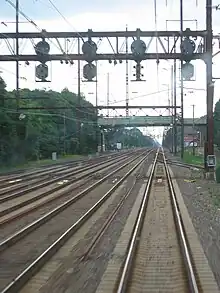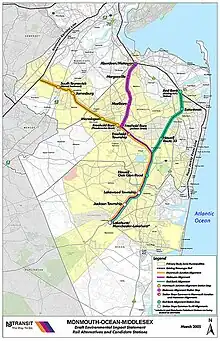
The Monmouth Ocean Middlesex Line (MOM) is a passenger rail project in the US state of New Jersey, proposed by NJ Transit Rail Operations (NJT) to serve the Central New Jersey counties of Monmouth, Ocean, and Middlesex.[1] The line would originate/terminate around Lakehurst at its southern end. It would junction with either the Northeast Corridor Line or North Jersey Coast Line to provide service north to Newark Penn Station, with potential connecting or continuing service to Hoboken Terminal or New York Penn Station.
The area is fast-growing, densely-populated and home to the fifth and eighth most populated municipalities in the state, Lakewood and Toms River, neither of which is served by passenger rail. Bus service is provided on NJ Transit bus routes 130-139 and from Lakewood Bus Terminal on the U.S. Route 9 corridor, which suffers from traffic congestion and safety issues.[2]
NJT completed a draft Major Investment Study distributed in 1996 identifying the need for new rail service for the counties and enhancement of U.S. Route 9 bus service.[3] The Federal Transit Administration (FTA) authorized the creation of a draft environmental impact statement in 2002, conducted by SYSTRA,[4] which identified three build alternatives in scoping documents.[5][6][7] A draft alternatives analysis report was released in 2010.[3] The baseline (no-build) alternative to expand the Route 9 BBS (bus bypass shoulder lanes) also remains under study.[8][3] The line is included in the Regional Plan Association's Fourth Regional Plan.[9]
The advancement of project beyond studies (commissioned by NJT or the North Jersey Transportation Planning Authority) has lagged due to lack of funding and political wherewithal.[10]

Alternative alignments

The line would travel north to provide diesel commuter rail service from Lakehurst/Manchester to Farmingdale passing through Toms River (Dover), Jackson, Lakewood, in Ocean and Howell in Monmouth. Stations would be located at Manchester-Lakehurst, Jackson, and Howell-Oak Glen Road. All alternatives include a rail yard at Lakehurst Maxfield Field.
From a junction in Farmingdale, three possible alignments are under consideration in Monmouth and Middlesex counties. One alternative would use an existing rail corridor that runs from to Lakehurst along the Jamesburg Branch, the Freehold Secondary, and the Southern Secondary (Southern Branch) and would join the Northeast Corridor Line at Monmouth Junction. Another would use an existing rail corridor from Lakehurst along the Southern Secondary and join the North Jersey Coast Line at Red Bank station. Another would use the abandoned Freehold Branch, Freehold Secondary, and the Southern Secondary from Matawan and join the North Jersey Coast at Aberdeen-Matawan station.[10][11]
Service would continue north to Newark Penn Station (with connecting or continuing service to Hoboken Terminal or New York Penn Station). The following candidate stations were identified in 2005:[12][13][14][15]
| Matawan alignment | Red Bank alignment | Monmouth Jct alignment |
|---|---|---|

Historical ROWs
The project would make use of the rights-of-way (ROW) of former branches of the Pennsylvania Railroad (PRR) and the Central Railroad of New Jersey (CNJ), some originally developed by New Jersey Southern Railroad, including CNJ's Blue Comet route to Atlantic City. The ROWs of the Southern Secondary (CNJ), largely owned by New Jersey Transit (NJT), and the Freehold Secondary (PRR) are partially in use for freight service by Conrail's (CRCX) North Jersey Shared Assets Operations (CSAO).[14][16]
The property for the inland sections of the Henry Hudson Trail is currently railbanked by NJT, which leases the line for a rail trail to the Monmouth County Park System. The former CNJ ROW is leased through 2020 unlike most rail trails, was never officially abandoned. NJT reserves the right to reinstitute rail service.[17] According to the Sierra Club, should NJT opt to restore service it would be the first instance in U.S history where a rail trail reverted to railway usage.[18]
Monmouth Battlefield State Park is traversed by the ROW used by the PRR's Farmingdale and Squan Village Railroad/Freehold and Jamesburg Agricultural Railroad.[19]
See also
References
- ↑ "Monmouth-Ocean-Middlesex Project". njtransit.com. Archived from the original on April 25, 2019. Retrieved March 29, 2023.
- ↑ "US 9 Corridor Study Managing and Accommodating Growth in Lakewood and Toms River, Ocean County". njtpa.org. NJTPA. December 2016. Archived from the original on September 23, 2017. Retrieved September 20, 2017.
- 1 2 3 "2014 Study and Development NJ Transit TN05001 Monmouth – Ocean – Middlesex Corridor Project". NJTPA. July 8, 2013. p. NJTransit 3 of 7. Archived from the original on August 24, 2016. Retrieved September 24, 2017.
- ↑ "M-O-M Rail Study Moving To Next Phase Public". NJ Transit. July 25, 2002. Retrieved September 24, 2017.
- ↑ Draft Environmental Impact Statement for the Monmouth-Ocean-Middlesex Rail; Monmouth, Ocean, and Middlesex Counties, NJ (Report). Federal Transit Administration. October 16, 2002. Retrieved September 23, 2017.
- ↑ "Monmouth–Ocean–Middlesex Rail Environmental Impact Statement Draft Scoping Document November 2002 U.S. Department of Transportation Federal Transit Administration and NJ Transit" (PDF). Archived from the original (PDF) on May 8, 2005.
- ↑ "Monmouth–Ocean–Middlesex Rail Environmental Impact Statement Project Summary October 2002" (PDF). Archived from the original (PDF) on January 8, 2006.
- ↑ "Middlesex County Route 9 Corridor Transit Linkages Study" (PDF). Middlesex County Department of Infrastructure Management Office of County Planning Division of Transportation. July 19, 2011. Archived from the original (PDF) on January 30, 2017. Retrieved September 20, 2017.
- ↑ Higgs, Larry (April 18, 2018). "Could this $71B T-Rex make future commuting problems extinct?". nj.
- 1 2 "Once-proposed Monmouth-Ocean-Middlesex rail line gathers dust". NJ.com. January 22, 2014. Retrieved March 5, 2017.
- ↑ "MOM Rail Alignments - Routes". Planning.co.ocean.nj.us. December 4, 2002. Archived from the original on October 6, 2006. Retrieved March 5, 2017.
- ↑ "M-O-M DEIS Rail Alternatives and Candidate Stations" (PDF). NJ Transit. 2005. Archived from the original (PDF) on March 5, 2020. Retrieved September 24, 2017.
- ↑ "New Jersey State Rail Plan" (PDF). NJT. April 2015. p. 5-15. Archived from the original (PDF) on August 5, 2014. Retrieved September 20, 2017.
- 1 2 "Rail Right-of-Way Inventory and Assessment". North Jersey Transportation Planning Authority. October 2013. Archived from the original on September 24, 2017. Retrieved September 23, 2017.
- ↑ "Draft Environmental Impact Statement for the Monmouth-Ocean-Middlesex Rail; Monmouth, Ocean, and Middlesex Counties, NJ". Federal Register. October 16, 2002.
- ↑ Office of Chief Engineer (March 1978). "Conrail Division Maps" (PDF). Conrail.
- ↑ "Matawan-Freehold RR added to Transit study". North/South Brunswick Sentinel. October 25, 2001. Archived from the original on September 30, 2007.
- ↑ "Henry Hudson Trail in Danger > Sierra Club Stories > Sierra Club". Archived from the original on June 28, 2010. Retrieved November 28, 2009.
- ↑ Berry, Coleen Dee (September 5, 2008). "Battlefield Latest Holdup for Rail Line". The New York Times. Retrieved September 24, 2017.
